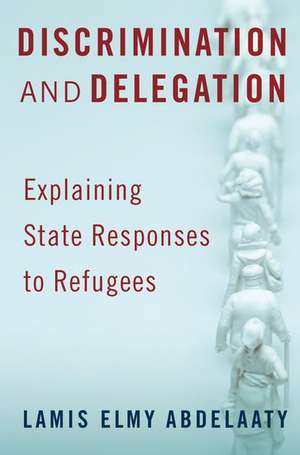Discrimination and Delegation: Explaining State Responses to Refugees
Autor Lamis Abdelaatyen Limba Engleză Paperback – 16 noi 2023
Preț: 153.52 lei
Preț vechi: 177.05 lei
-13% Nou
Puncte Express: 230
Preț estimativ în valută:
29.38€ • 30.75$ • 24.45£
29.38€ • 30.75$ • 24.45£
Carte disponibilă
Livrare economică 27 februarie-05 martie
Livrare express 21-27 februarie pentru 47.28 lei
Preluare comenzi: 021 569.72.76
Specificații
ISBN-13: 9780197753385
ISBN-10: 0197753388
Pagini: 248
Dimensiuni: 234 x 157 x 15 mm
Greutate: 0.36 kg
Editura: Oxford University Press
Colecția OUP USA
Locul publicării:New York, United States
ISBN-10: 0197753388
Pagini: 248
Dimensiuni: 234 x 157 x 15 mm
Greutate: 0.36 kg
Editura: Oxford University Press
Colecția OUP USA
Locul publicării:New York, United States
Recenzii
In this brilliant book, Lamis Abdelaaty effectively combines qualitative and quantitative methods to explain why some states are more generous to refugees than others. The answers she provides — that policymakers will be more open to those fleeing a hostile state and who share the ethnic identity of the policymakers — matter profoundly for both scholarship and practice.
Departing from much of the literature that examines whether countries let refugees in, Abdelaaty usefully reminds the reader that countries are more generous to some refugee groups than others and vary in their willingness to delegate to the UNHCR as well. She argues that both choices are a product of a combination of domestic and international politics. Using a terrific mixed methods design, this book sheds light on the response to refugee emergencies both in the past and today, and will help scholars and policymakers better understand the emergencies of the future.
Discrimination and Delegation explores a timely and extremely important topic in international politics: state responses to refugee inflows. Lamis Abdelaaty provides a compelling explanation for why states choose to manage refugee policies themselves versus enable the UN High Commissioner for Refugees to do so, and carefully presents both qualitative and quantitative evidence in support of her theory. Academics studying refugee flows, policy makers, and human rights defenders will find this book to be an illuminating read.
In this fascinating book, Lamis Elmy Abdelaaty examines the political determinants of asylum policy. Wielding a variety of data and methods, including cross-national statistics, archival research, and fieldwork in Egypt, Turkey and Kenya, Abdelaaty argues that states balance international and domestic interests in selecting policies of restriction, inclusion, or delegation. Compelling and insightful, the book brings a fresh, multi-level analysis to refugee studies and serves as a model for empirically rigorous, theoretically sophisticated scholarship on human rights.
Departing from much of the literature that examines whether countries let refugees in, Abdelaaty usefully reminds the reader that countries are more generous to some refugee groups than others and vary in their willingness to delegate to the UNHCR as well. She argues that both choices are a product of a combination of domestic and international politics. Using a terrific mixed methods design, this book sheds light on the response to refugee emergencies both in the past and today, and will help scholars and policymakers better understand the emergencies of the future.
Discrimination and Delegation explores a timely and extremely important topic in international politics: state responses to refugee inflows. Lamis Abdelaaty provides a compelling explanation for why states choose to manage refugee policies themselves versus enable the UN High Commissioner for Refugees to do so, and carefully presents both qualitative and quantitative evidence in support of her theory. Academics studying refugee flows, policy makers, and human rights defenders will find this book to be an illuminating read.
In this fascinating book, Lamis Elmy Abdelaaty examines the political determinants of asylum policy. Wielding a variety of data and methods, including cross-national statistics, archival research, and fieldwork in Egypt, Turkey and Kenya, Abdelaaty argues that states balance international and domestic interests in selecting policies of restriction, inclusion, or delegation. Compelling and insightful, the book brings a fresh, multi-level analysis to refugee studies and serves as a model for empirically rigorous, theoretically sophisticated scholarship on human rights.
Notă biografică
Lamis Elmy Abdelaaty is an Assistant Professor of Political Science at the Maxwell School of Syracuse University, and Senior Research Associate at the Campbell Public Affairs Institute. Her research and teaching deal with the international politics of refugees, and her publications have appeared in Journal of Ethnic and Migration Studies and Journal of Refugee Studies. Her research has been supported by the National Science Foundation, the American Philosophical Society, the Mamdouha S. Bobst Center for Peace and Justice, and the Princeton Institute for International and Regional Studies. Abdelaaty holds a doctoral degree in politics from Princeton University.
